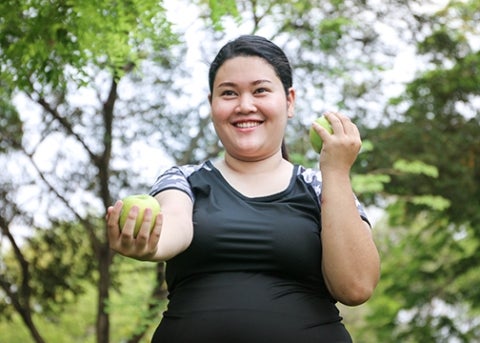Cal Poly Study Finds Behavioral, Psychological Factors Critical Factors in Maintaining Healthy Habits

Contact: Nick Wilson
805-235-8008; nwilso28@calpoly.edu
SAN LUIS OBISPO — A comprehensive weight-loss maintenance study led by a Cal Poly research team and supported by WeightWatchers found that a wide range of factors — from body image, to food cues that spark cravings, to self-monitoring — can differ between people who regain weight versus those who do not.
In recognition of the findings, published in the paper, “Behavioral, Psychological, and Environmental Predictors of Weight Regain in a Group of Successful Weight Losers in a Widely Available Weight-Management Program,” the research has been selected for presentation at the prestigious Obesity Journal Symposium during ObesityWeek, in Dallas, Oct. 14-17.

Photo by Izzy Kelly
“This study comprehensively examines the different factors that relate to weight loss maintenance versus regain among those who had already lost over 20 pounds,” said Suzanne Phelan, director of Cal Poly’s Center for Health Research and a professor of kinesiology and public health in the Bailey College of Science and Mathematics. “And because the study is so comprehensive, we have the ability to determine which factors are most important.”
The study assessed 2,843 individuals, all participants who had lost at least 20 pounds and kept it off for at least one year on the WeightWatchers weight-management program. On average, they had lost 56 pounds and kept it off for three and a half years. One year later, 57.4% were classified as “weight maintainers” (having maintained their weight within roughly five pounds) and 42.6% as “gainers” (those who gained at least five pounds).
“Relative to those who maintained weight loss, those who gained at least 5 pounds showed greater challenges in sustaining eating habits in the face of a variety of food cues or triggers such as the sight of food, social situations, taste and smell of food, and feelings,” said Gary Foster, chief scientific officer at WeightWatchers. “Similarly, those who maintained weight loss had greater acceptance of uncomfortable food cravings and showed greater intrinsic drives to consume less healthy foods that conflicted with weight loss goals.”
Bodily pain, caused by factors such as injuries or health problems, was another contributor to weight gain and considered a “quality-of-life metric.”
“We’re unsure if bodily pain caused overeating and reduced activity or if weight regain preceded bodily pain,” said Phelan, emphasizing the need for more frequent follow-up. “The team will conduct annual assessments and develop interventions for overeating, body image and self-monitoring. Promoting positive body image, irrespective of size, is crucial, as it's linked to better psychological and physical well-being, including addressing weight regain.”
Added Foster: “This new study is hugely encouraging as it reaffirms our belief that there isn't only one way to support an individual's weight health, and in fact, there are many complex factors that determine positive outcomes.

iStock photo
“By acknowledging and understanding these nuances whether that is the critical need for self-compassion, or the importance of monitoring, we can help people to access the right tools for them in the long term,” he said.
Phelan will present the findings of the Cal Poly and WeightWatchers collaborative study at the symposium on Oct. 16. Her presentation will take place during the 41st annual meeting of The Obesity Society, a nonprofit and leading organization of about 2,800 scientists and health professionals devoted to understanding and reversing the epidemic of obesity and its adverse health.
Insights and findings from the study will also be published in the Oct. 16 edition of Obesity, a peer-reviewed journal covering topics regarding health and medicine.
The study conducted with researchers from the University of Florida College of Medicine and the Perelman School of Medicine at the University of Pennsylvania will continue on an annual basis and will also compare U.S. weight-loss maintainers with people from around the world.
For more information, visit www.obesityweek.org and research the Interactive Schedule under the Program tab.
About Bailey College of Science of Mathematics
The Center for Health Research is a program of Cal Poly’s Bailey College of Science and Mathematics. The college of about 2,800 undergraduate and roughly 280 graduate students offers degrees in biology, chemistry, kinesiology and public health, physics, mathematics, statistics, marine science, microbiology, and biochemistry. The college is also home to the university’s undergraduate Liberal Studies program for future teachers, and Cal Poly’s post-baccalaureate School of Education. The college, which embraces Cal Poly’s Learn by Doing mission, is an esteemed institution, noted for outstanding undergraduate research and significant student co-authorship participation on scientific journal publications.

iStock photo



